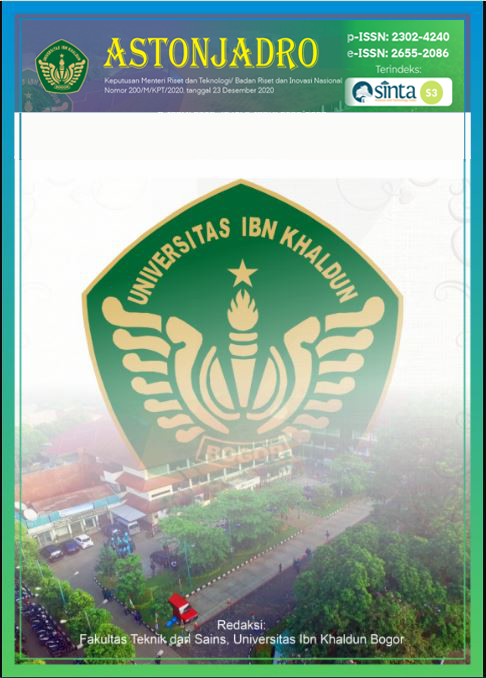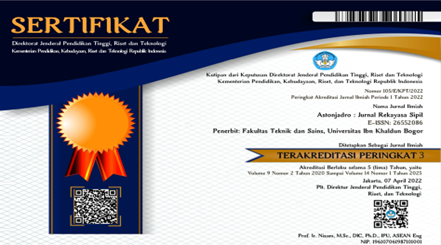Analysis Level of Comfort, Safety and Safety Level on Pathways in The Kebayoran Baru Area, South Jakarta
DOI:
https://doi.org/10.32832/astonjadro.v12i2.8379Keywords:
Sidewalks, Pedestrians, Comfort, Security, SafetyAbstract
As the population increases, resulting in high human mobility. However, high mobility is not matched by services for transportation facilities and infrastructure, especially sidewalks. One of the areas with existing sidewalk problems is the Kebayoran Baru area of South Jakarta. The problem that occurs is that the sidewalk is used as a place to street vendors, and is used as an illegal parking lot. The methodology of this research was carried out by conducting a geometric survey, measuring the volume and travel time of pedestrians to determine the level of service and distributing questionnaires as 80 respondents to pedestrians in search of the level of performance and importance of sidewalk facilities. This data processing uses Microsoft Excel and Statistical Product and Service Solutions (SPSS). The results of the analysis carried out that the sidewalks do not meet the minimum standards according to regulations. From the measurement of the results of the volume and travel time of pedestrians, the level of service with category A is obtained, as well as the results of the questionnaire related to the level of comfort, security, and safety of pedestrians influenced by the presence of street vendors and illegal parking on sidewalks.
References
Arikunto, S. (2010). Research Procedure, A Practical Approach. (Revised Edition), 191- 313, Rineka Cipta, Jakarta.
Ashadi, Houtrina, R., & Setiawan, N. (2012). Analysis of the Effect of Complementary Elements of Pedestrian Paths on Pedestrian Comfort Case Study: Pedestrian Orchard Road Singapore. Nalars, 11(1), 77–90.
Ayu Purbasari, P., Analysis of Comfort Level, Safety, and Pedestrian Safety Against Utilization Of Streets, (2019). (Electronics) Faculty of Engineering, Islamic University of Balitar. In Qua Teknika 9 (2) 12-19. https://doi.org/10.35457/quateknika.v9i2.823
Dermawan, W. B., & Daputro, N. A. (2021). Attribution 4.0 International (Cc By 4.0) Pedestrian Facility Analysis For Utilization And Comfort (Case Study Of Bekasi Highway Km.18). Ijti (International Journal of Transportation and Infrastructure), 4(2), 157–168. https://doi.org/10.29138/ijti.v4i2.1341
Fruin, John J. (1979). Pedestrian Planning and Design, Metropolitan Association of Urban Designers and Environmental Planners, Inc., New York.
Gideon, Giovany. (1977). Human Aspect of Urban Form, Pergamon Press, Oxford.
Indonesia, K. B. (2008). Indonesian dictionary. Language Center of the Ministry of National Education.
Iswanto, Danoe. (2006). The Effect of Complementary Elements of Pedestrian Paths on Pedestrian Comfort (Case Study: Cut off Jalan Pandanaran, Starting from Jalan Randusari to Tugu Muda Area) ENCLOSURE, 5 (1), 21-29. http://eprints.undip.ac.id/18474/
Decree of the Director General of Highways. (1999). Number: 76/Kpts/Db/1999 concerning Guidelines for Planning Pedestrian Paths on Public Roads, 1
Khisty, C. J. and Lall, B. K. (2005). Fundamentals of Transportation Engineering. Jakarta : Erlangga.
Kolcaba, Katharine. (2003). Comfort theory and practice, a vision for holistic health care and research, Springer Publishing Company, New York.
Kostof, Spiro. (1992). The City Assembled, The Element of Urban Form Through History, Thame and Hudson Ltd, London.
Moughtin, Cliff. (2003). Urban Design – Street and Square, Third Edition, Architectural Press, Oxford.
Widyaningsih, N., Mohtar, W. H. M. W., Afdal, N., J a l a l u d i n, J. (2022). Study of Motorcycle Rider Safety Behavior Using Structural Equation Modeling, nternational Journal on "Technical and Physical Problems of Engineering” (IJTPE), 14 (51), 307-313. http://www.iotpe.com/IJTPE/IJTPE-2022/IJTPE-Issue51-Vol14-No2-Jun2022/38-IJTPE-Issue51-Vol14-No2-Jun2022-pp307-313.pdf
Widyaningsih, N., Daniel, O. (2019) Analysis of the Characteristics and Behavior of People's Crossings at the Zebra Cross and Pelican Cross Crossing Facilities (Case Study of the Mh Thamrin Road), Jurnal Pengembangan Rekayasa dan Teknologi, 15 (1), 27-32. https://journals.usm.ac.id/index.php/jprt/article/view/1486
Ofin, W., Daru, L., & Wally, S. (2021). Pedestrian Comfort Studies on Sidewalks. Journal of Civil Engineering: Design and Construction, 07(01), 20–25. https://docplayer.info/208780685-Studi-kenyamanan-pejalan-kaki-di-trotoar.html
Guidelines for Planning, Provision, and Utilization of Pedestrian Network Infrastructure and Facilities in Urban Areas, Ministry of Public Works 1 (2014). Http://Pug-Pupr.Pu.Go.Id/_Uploads/Produk_Pengaturan/Permen Pupr No 03-2014.Pdf
Government Regulation of the Republic of Indonesia No. 16 of 2004 concerning Land Administration, Government Regulation No. 16 of 2004 concerning Land Administration 1 (2004).
Rubenstein, Harvey M. (1987). A Guide to Site Planning and Landscape Construction, Fourth Edition, John Wiley & Sons, Inc., New York.
Saraswaty, R. (2017). Pedestrian Convenience on the Use of Sidewalks on Jalan Brigjen Katamso Medan. Journal of Education Building, 3(1), 9–14. https://jurnal.unimed.ac.id/2012/index.php/eb/article/view/7438/0
Shivani, Hamid. (1985). The Urban Design Process, Van Nostrand Reinhold, New York.
Spreiregen, Paul D. (1965). The Architecture of Towns and Cities, McGraw Hill Book
Sugiyono. (2013). Administrative Research Methods. 2008 Edition, Alfabeta Publishers, Bandung.
Syoufa, A. (2017). Overview of Pedestrian Comfort and Safety Levels on Sidewalk Design at Jalan Margonda Raya Depok and Jalan Padjajaran Bogor. Journal of Construction Design, 16(2), 142–150. https://ejournal.gunadarma.ac.id/index.php/dekons/article/view/1803/0
Law of the Republic of Indonesia Number 25 of 2009 concerning Public Services, Law of the Republic of Indonesia 1 (2009). Https://Doi.Org/10.1038/132817a0
Unterman, Richard, K. (1984). Accommodation the Pedestrian, Van Nostrand Reinhold Company, New York.
Downloads
Published
How to Cite
Issue
Section
License
Copyright (c) 2023 ASTONJADRO

This work is licensed under a Creative Commons Attribution-ShareAlike 4.0 International License.
Paper submitted to ASTONJADRO is the sole property of the Astonjadro Journal. Unless the author withdraws the paper because he does not want to be published in this journal. The publication rights are in the journal Astonjadro.ASTONJADRO
LICENSE
This work is licensed under a Creative Commons Attribution-ShareAlike 4.0 International License.
Based on a work at http://ejournal.uika-bogor.ac.id/index.php/ASTONJADRO













